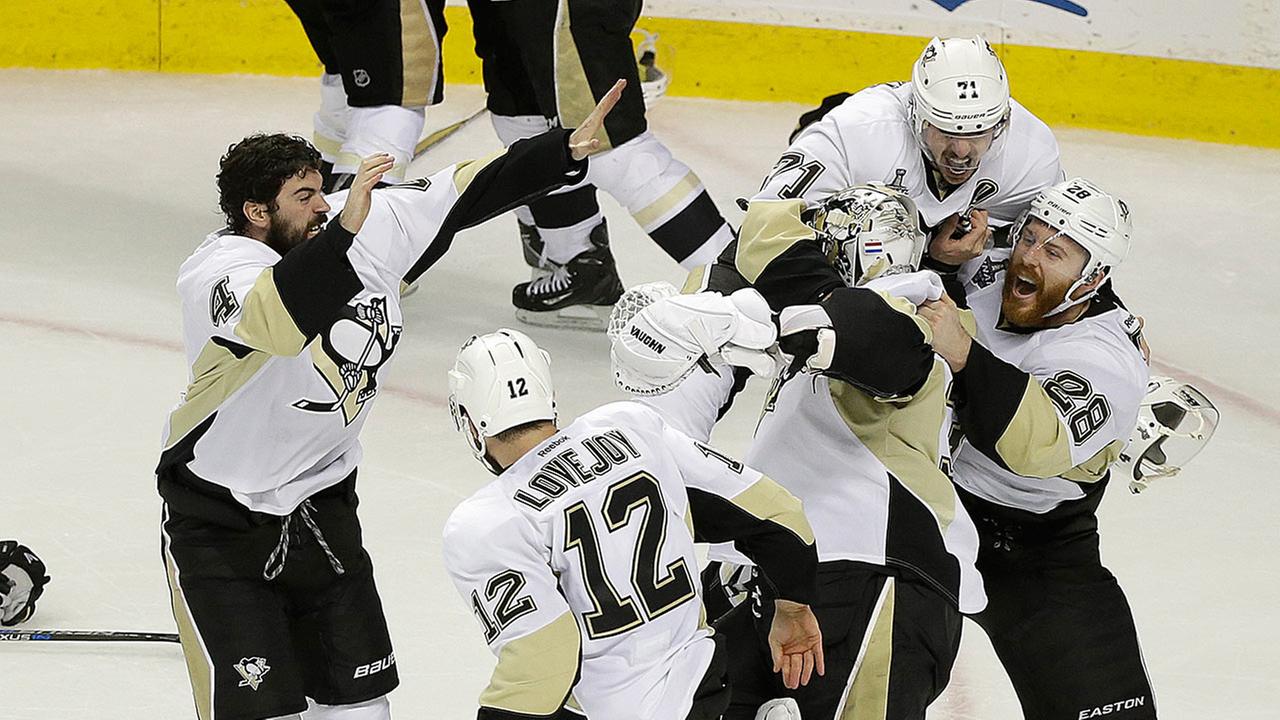Mon., June 13, 2016

Pittsburgh Penguins players celebrate after beating the San Jose Sharks in Game 6 of the NHL hockey Stanley Cup Finals in San Jose, Sunday, June 12, 2016. (AP)
Hockey is hard. The playoff season is its own year; by the end, players can barely remember the beginning. Injuries pile up like cars in a highway crash; the waves of hyper intense emotion rise and fall, rise and fall. Look how players act when they win, and lose. Either way, in exploding joy or crushing sorrow, it is a release.
The Pittsburgh Penguins, however, enjoyed themselves. They were disciplined, sure, and gave it their whole hearts, because you have to. They suffocated San Jose, yes. In the 32 minutes and 14 seconds after Kris Letang and Sidney Crosby wrestled back Pittsburgh’s lead and destiny, the Sharks managed six shots. But as they defended, the Penguins attacked. And it worked partly because how they play is both well-coached, and not coached to within an inch of its life.
“It’s a lot of fun,” said Penguins forward Carl Hagelin, earlier in the series. “You know you can use your speed as much as you want, as long as you get back in the play. As long as you have your D up the ice you can be as aggressive as you want. It’s a fun way to play, and it works for our team.”
It works, yes. Pittsburgh didn’t break scoring records, because nobody does that in the playoffs anymore. But they let their players play a little more than most.
“It’s a little bit more speed here, not as controlled everything,” said Hagelin, who joined the Penguins from Anaheim in January. “It’s always hard to compare systems to systems, because there’s different personnel, different abilities. But like I said, it’s not as controlled everything. You're allowed to fly and go. We’re allowed to fly the zone if we see our D have full control. Some teams, they need everyone to be in a specific spot. We’re allowed to find our way out of our zone. Flippers and stretch passes, stuff like that.”
“I don’t think we’re giving up anything defensively by creating those plays . . . which I think is a distinct difference from teams that are purely run and gun,” said Penguins defenceman Ian Cole. “Like the Edmonton Oilers perhaps, who are either going to win by four goals or lose by four goals. And I think we’re much more calculated.”
Indeed, some teams try to run and gun without a net. Toronto tried it when they had Phil Kessel, but he’s in a better place now.
“I think there’s a difference between cheating, like cheating like we were my first year in Toronto, looking for big plays, don’t stop in D zone and just kind of circle around and just play offence, just put everything into offence — it’s kind of different what Pittsburgh’s doing,” said Sharks defenceman Roman Polak.
More and more, hockey has become the overcoached game. One reason the world juniors is so entertaining are the teenage mistakes, and the scrambling chaos they create. Pittsburgh’s speed and aggressiveness created chaos. (Look at the net, Chris Kunitz!) The NHL is a conservative league, and never more so than in the playoffs. Last year, the talent-laden Chicago Blackhawks played the league-leading scorers from the Tampa Bay Lightning for the Cup. We got a nearly airtight parade: 2-1, 4-3, 3-2, 2-1, 2-1, and 2-0.
Martin Jones kept the final low-scoring, but the Penguins piled up chances, and hung 37 goals in 11 games against Henrik Lundqvist and Braden Holtby in the first two rounds, too. It’s not like they’re the 1980s Oilers, but they’re something close to fun. It helps, of course, that Sidney Crosby, Evgeni Malkin and Kessel are able to drive play on three different lines. (All the Leafs needed to properly build around Kessel, as it turns out, were Sid, Geno, a new coach and Letang.) But they let guys skate. The result was a team that turned into the league’s best possession team after Mike Sullivan replaced Mike Johnston as coach, playing with hellacious speed and skill.
“You’ve got to dance with the girl you brought,” said Sharks goaltender James Reimer with a grin. “If you’re a hard, heavy team you’re not going to play a run-and-gun style. How many teams have that many skill players, right?”
And so now Crosby has a Conn Smythe and a second Cup, and is being appreciated again. I asked Sharks defenceman Paul Martin about the game’s best player, and the names that have been offered over the years, from Claude Giroux to Jonathan Toews.
“For some people, they weigh on Cups,” said Martin. “And they’ve had a good run there, in Chicago. But there’s not really a comparison (between Crosby and Toews).”
He said he’d love to have Toews on his team in the playoffs, because of the way Toews plays. He said Crosby’s Penguins can cheat and float sometimes. But the Penguins have one fewer Cup than Chicago, and Crosby’s not done. But he said Crosby’s the best. As Kunitz says, “(Cups are) how he’ll be measured at the end of his career, but for his time, he’s been the elite player that everybody’s put their mark against.”
Coaches live in terror of the bad goal, and league-wide scoring continues to dip. Conservatism remains entrenched. The Penguins won with speed, skill, and the licence to use both. Long may it reign.
No comments:
Post a Comment